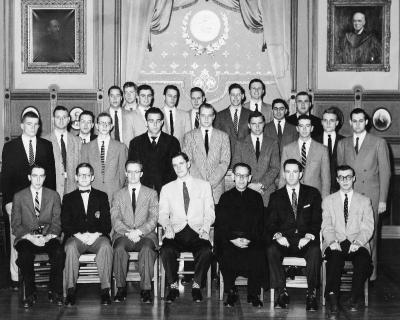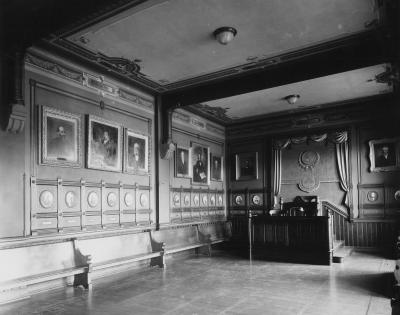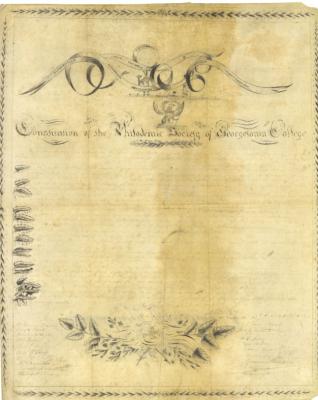Founded on January 21, 1830, the Philodemic Society is Georgetown's premier debate society and the oldest continuous debate society in the nation.1The society is the oldest secular organization at Georgetown and has continued to be an intellectual forum for Georgetown students, alumni, and faculty to engage in debates and practice the art of public speaking.
History and structure
The Philodemic Society was founded in 1830 by James Ryder, S.J., Georgetown's Vice President. The name of the debate organization was chosen for its Greek roots, meaning "a love of the people." The society's motto is Eloquentiam Libertati Devinctami, or "eloquence in defense of liberty." While currently the society only meets once a week, historically they met at least two or three times per week, with fines on late or absent members. The first subject debated by the Philodemic Society was "whether Napoleon Bonaparte or George Washington was the greater historical figure."2
Historically, officers of the Philodemic serve after being elected. Originally, officers of the Society included President, Vice President, Secretary, Corresponding Secretary, Librarian, Treasurer, Amanuensis, and Censor. These titles have changed over the years, including additional positions such as Sergeant-at-arms.
In 1850, the Philodemic Society had their meeting privileges revoked for one month after defying instructions from one of the Prefects on holding a late-night meeting. In response, students began to revolt, throwing stones and setting off firecrackers for this unfair punishment. As a result, three Philodemicians were expelled. After much protest and attention from Washington media and congressmen, the students were allowed back on campus after giving a formal apology for the damage.
A few years before the start of the Civil War, the Philodemic Society gathered to discuss the topic "Should the South now secede?" This debate garnered a lot of controversy and spanned multiple meetings. After two weeks, the Society affirmed the resolution and agreed that the South should secede. The verdict led to controversy and in response, Philodemic members from the North and South began a brawl, which led to the ban of any further Philodemic meetings for that academic year.
After many years of lobbying the University for a space to hold their meetings, the Philodemic finally took possession of rooms on the third and fourth floor of Healy Hall on December 13, 1881. At the beginning of the academic year in 1977, Philodemicians saw that the President's office was building cubicles to accommodate additional staff members. After widespread protests from students and faculty, the Philodemic was able to protect their room. In 2022, after construction began in the Philodemic Room, the society relocated to the Riggs Library for their weekly debates. The Philodemic has its own library, currently located on the 4th floor of the Leavey Center, with its own collection of books.
One of the Philodemic society's most important figures was Father John S. Toohey, SJ, who served as Chancellor of the Society from 1911 till 1947. Under his tutelage, the Philodemic society was undefeated in intercollegiate competition for nearly two decades, starting in 1921.
The Philodemic's golden age was the period from 1967 to 1983, under the coaching of James Unger. During this period, Georgetown's Philodemic consistently produced teams which ranked at the top of the nation. 3Beginning in the 1980s, the Philodemic began to experience many problems with the club. In 1983, Philodemic Coach James Unger was suspended from the University for misappropriating funds. The society almost dissolved in 1989 when the program lacked enough members and interest. Luckily, the "reconstitution" of the Society in 1990 enabled the Philodemic to regain its spirit and continue on to this day. Although in the 90s there were only around 20 members, by the 2011-2012 academic year, the Society consisted of 80-100 members.
Traditions and special debates
The Philodemic Society has a variety of interesting traditions dating back centuries. To become an official member of the Philodemic, you must have made 3 speeches, attended mentor workshops, and presented a keynote speech in your induction debate. At the end of the induction debate, a lot of time is dedicated to giving toasts to mentors and fellow Philomenisians.
The Christmas Debate is hosted right before winter break and has a light-hearted debate topic to celebrate the end of the semester.
The Richard T. Merrick Debate is one of the most anticipated debates of the year. Founded in 1874 by Richard T. Merrick, the Merrick Medal is awarded to the most eloquent and experienced speaker of the year. The first Merrick Debate was held on February 23, 1875 with the topic, "Would the exclusive possession and control of the telegraph by the government of the United States be in accordance with the spirit of our institutions?" 4Every year, the Merrick Debate has focused on relevant issues to the time. In 1877, for example, the debate focused on "The use and sale of intoxicating liquors."
The George E. Hamilton Debate is a special debate that invites alumni to debate with current members and is held on Homecoming weekend. 5
Dean Richard Alan Gordon Debate was established in 1995 to commemorate his efforts to help the club. It focuses on the use of white in rhetoric.
Notable alumni
The Philodemic Society prides itself on its notable alumni. This includes two Supreme Court justices: Edward Douglass White, 9th Chief Justice of the U.S. Supreme Court, and Antonin Scalia, former Associate Justice of the Supreme Court. Other prominent alumni include Francis Keating, the 25th Governor of Oklahoma, and Philip Hart, former Democratic Senator from Michigan.
- 1Desnick, Michael, et al. "The History of the Philodemic Society, 1830-2011," 2012, https://philodemic.files.wordpress.com/2012/02/the-history-of-the-philodemic-society.pdf
- 2Ibid.
- 3Gorski, Theresa and Kitsock, Greg. "The Arc of Excellence: Controversy and tradition at the Philodemic Society," The Hoya Review, Oct 1985,p. 12
- 4McManus, Mary. "Debate at Georgetown 1800-1900," English IV Class, June 1, 1963.
- 5George, Eric, "The Cultivation of Eloquence at Georgetown College: A History of the Philodemic Society from 1830-1890, The Philodemic Society, p.115




